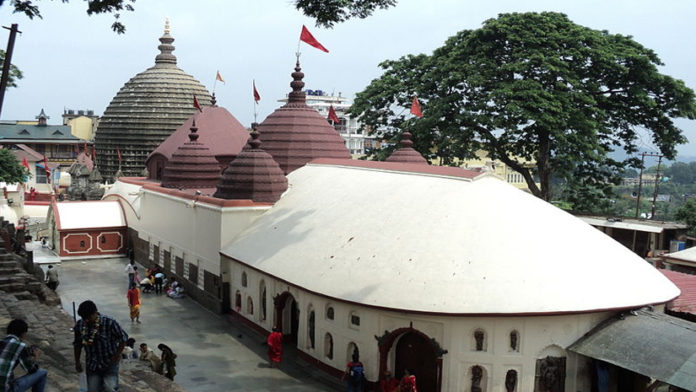One of the famous piligrimage undertaken by various Hindus, is that of Kamakhya temple, a famous pilgrimage at Nilachal hill, Guwahati, AssamThe Kamakhy, is dedicated to the tantric goddesses. The temple houses 10 different avatars of Goddess Kali, apart from the Kamakhya Devi, we see Dhumavati, Matangi, Bagola, Tara, Kamala, Bhairavi, Chinnamasta, Bhuvaneshwari and Tripuara Sundari.
 Kamakhya Temple is one of the most revered temples, dedicated to womb and vagina- to child birth and menstruations.
Kamakhya Temple is one of the most revered temples, dedicated to womb and vagina- to child birth and menstruations.
 The mythical origin is that Kind Daksha, to maintain peace, invited Lord Shiva, husband of his daughter, Sati; While Shiva was reluctant, Sati attended her father’s great yagna, where, her father insulted her husband, filled with rage, Sati jumped into the fire and killed herself. When Shiva was told of the incident, furious with rage, he placed Sati’s dead body on his shoulders and started his dance of destruction, also called, tandav.
The mythical origin is that Kind Daksha, to maintain peace, invited Lord Shiva, husband of his daughter, Sati; While Shiva was reluctant, Sati attended her father’s great yagna, where, her father insulted her husband, filled with rage, Sati jumped into the fire and killed herself. When Shiva was told of the incident, furious with rage, he placed Sati’s dead body on his shoulders and started his dance of destruction, also called, tandav.
 Scared, and to calm him down, Lord Vishnu, with the help of his Sudarshan Chakra, cut the body of Sati into 108 pieces, which fell at 108 different places – it is these places, that are called Shakti peeths.
Scared, and to calm him down, Lord Vishnu, with the help of his Sudarshan Chakra, cut the body of Sati into 108 pieces, which fell at 108 different places – it is these places, that are called Shakti peeths.
 Kamakhya temple is built on the place, where Sati’s womb and vagina fell. Also, another legend associated is with the name- ‘Kamakhya’: The God of love, Kamadeva, who lost his virility due to a curse and it was here, that after praying, that he was freed from his curse and regained his potency.
Kamakhya temple is built on the place, where Sati’s womb and vagina fell. Also, another legend associated is with the name- ‘Kamakhya’: The God of love, Kamadeva, who lost his virility due to a curse and it was here, that after praying, that he was freed from his curse and regained his potency.
 This temple is also famous as it is the temple of The Bleeding Goddess. The womb and vagina of Shakti are present in theinner sanctum, also called as’Garbagriha’. In the month of Ashaad, the goddess bleeds or menstruates, and the Brahmaputra river near the areas of theKamakhya turns red. The temple then remains closed for 3 days- to let the Devi rest and holy water is distributed among the devotees.
This temple is also famous as it is the temple of The Bleeding Goddess. The womb and vagina of Shakti are present in theinner sanctum, also called as’Garbagriha’. In the month of Ashaad, the goddess bleeds or menstruates, and the Brahmaputra river near the areas of theKamakhya turns red. The temple then remains closed for 3 days- to let the Devi rest and holy water is distributed among the devotees.
 The thing that holds the interest is that there is no statue, idol or image of the goddess in the temple, but in the corner of the cave in the temple, there is sculptured image of the Vagina of the goddess- and that is the object of worship and reverence- and the strange part is that the vagina remains moist- reverberating the natural environment of the female vagina- this is due to the natural atmosphere around the temple that keeps the stone image moist.
The thing that holds the interest is that there is no statue, idol or image of the goddess in the temple, but in the corner of the cave in the temple, there is sculptured image of the Vagina of the goddess- and that is the object of worship and reverence- and the strange part is that the vagina remains moist- reverberating the natural environment of the female vagina- this is due to the natural atmosphere around the temple that keeps the stone image moist.
 Now, we come to the most important question- is there a scientific proof for the menstruating goddess? No, it is just the belief that Devi undergoes her menstruation and many people are in the assumption that the priests pour vermilion into the waters.- True or mythical- let’s keep the argument aside and let us all celebrate the symbol of women’s fertility, creativity and power to give birth.
Now, we come to the most important question- is there a scientific proof for the menstruating goddess? No, it is just the belief that Devi undergoes her menstruation and many people are in the assumption that the priests pour vermilion into the waters.- True or mythical- let’s keep the argument aside and let us all celebrate the symbol of women’s fertility, creativity and power to give birth.
By: Archa Dave



























